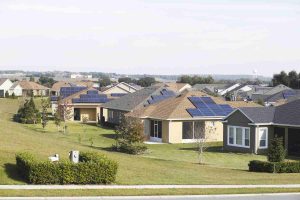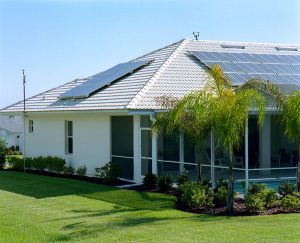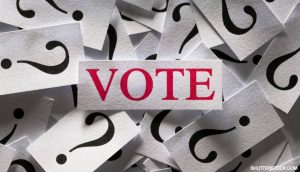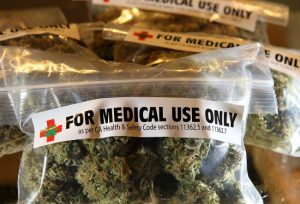South Miami is poised to become the first city in the Sunshine State to require new single family homes be built with solar panels.
If the ordinance passes on final reading Wednesday evening, the requirement would also be for any homes that have renovations to 75 percent or more of its footprint. The threshhold was 50 percent at first reading (passed 4-0 with Commissioner Josh Liebman absent) but it was changed after some pushback from either the community or Big Energy disguised as the community.
A group calling itself Family Businesses for Affordable  Energy has opposed the ordinance, saying it puts an unfair burden on builders and homeowners who want to renovate or expand. They made their case at the first second hearing last month and the item was tabled until this week.
Energy has opposed the ordinance, saying it puts an unfair burden on builders and homeowners who want to renovate or expand. They made their case at the first second hearing last month and the item was tabled until this week.
“South Miami is already one of the most unaffordable communities in South Florida. We believe that Mayor Stoddard and the city commission’s efforts to mandate $25,000 solar panels will make it even more unaffordable,” said Juan Penalosa, a paid spokesman for the group, who is trying to make this an affordable housing issue.
“We aren’t opposed to solar, far from it,” Penalosa said. “But, a mandate without any incentives and a mandate that will drive up home costs significantly when we are already struggling with affordable housing, is not the way to go about this.”
The group suggests that the city make the requirement only for homes larger than 2,000 square feet and not at all for existing homes that owners want to remodel.
But Mayor Philip Stoddard, a staunch environmentalist and biology professor at Florida International University, says the $25,000 cost is only for the largest homes that can afford it — the required coverage increases with square footage — and he has no problem including gentrifying homeowners who want to turn those little pink houses in the ‘hood into McMansions or their more aethetic equivalent. He says the investment pays off in the long run with higher property values and saved energy costs.
Furthermore, he suspects that Family Businesses for Affordable Energy is really a front for FP&L, whose representatives had early on expressed issues with any ordinance requiring solar panels.
“We also require that they put in trees and nobody complained about that. Coral Gables requires a barrel tile roof, which costs twice as much as shingles, and nobody complains about that,” Stoddard told Ladra.
“Solar is a benefit to the builders. They can charge more for the house. Solar is a benefit for the homeowner. Who are these family businesses? Because solar installers are going to be making money instead of FP&L. Builders are going to make money on this. The only ones who are not being helped by this are FP&L and Exxon,” Stoddard said, adding that the costs of solar are going down and it will cost even less in future years to install the panels.
“FP&L riled everybody up.”
It’s not unfathomable. The utility giant and other Big Energy companies spent $21 million last year trying to push a  fake pro-solar amendment which would have actually limited the use of solar energy for years. The voters rejected it after their scheme was exposed. And the Family Businesses group’s website does seem to exist solely to bash solar energy, including sections on “solar horror stories” and “the real cost of solar.”
fake pro-solar amendment which would have actually limited the use of solar energy for years. The voters rejected it after their scheme was exposed. And the Family Businesses group’s website does seem to exist solely to bash solar energy, including sections on “solar horror stories” and “the real cost of solar.”
Penalosa told Ladra that he was offended by any such insinuation. A former Democratic Party operative and big Hillary Clinton supporter, he calls himself a progressive. Except he is also a mercenary for hire who told Ladra he was working with the local chapter of “a national organization of energy and family businesses.”
Key word: energy.
He’s not the only one who spoke against the measure at the meeting last month where the issue was deferred. A group of builders and some homeowners raised concerns about how this would affect an already inflated real estate market. Others raised concerns about safety in hurricanes — though we have pool screens and barrel roof tiles that definitely become missiles, so that’s nothing new. The FP&L spokeswoman also urged the South Miami commission to drop the matter, naturally, saying that electric bills in Florida are not that high. Move along, folks. Nothing to see here.
But, on this topic at least, Ladra tends to believe the nerdy science professor more than the professional spin doctor and the profiteering home builders and the mouthpiece for Big Energy.
“I’m doing this because the planet has three years to get our carbon emissions down or its going to clobber us,” he said. “We have precious little time to get this done. It’s not about me and it’s not about FP&L. This is about our children and grandchildren.”
The commission meeting begins at 7 p.m. at South Miami City Hall, 6301 Sunset Drive.
read more
No matter how they feel about the presidential results of last week’s election, the victory over the proposed and  misleading solar choice amendment, which was soundly defeated, and the 72% turnout in Miami-Dade will be celebrated Wednesday when the League of Women Voters of Miami-Dade County gets together for a post-election gathering.
misleading solar choice amendment, which was soundly defeated, and the 72% turnout in Miami-Dade will be celebrated Wednesday when the League of Women Voters of Miami-Dade County gets together for a post-election gathering.
“I know that we are all dealing with the election results in our own way and within our respective organizations,” wrote League President Susan Windmiller in an email Monday.
“However, we should take some comfort in knowing that the voter turnout in Miami-Dade was 72%! and that we defeated Amendment 1 re: solar energy, a real David v. Goliath victory!”
She also wants to focus on the impact that the presidential election results could have in increasing popular participation in politics. The non-partisan group, famous for its voter registration drives, also takes on policy issues and is currently focused on advocating campaign finance reform.
“The League believes that there is tremendous opportunity for engagement in democracy like never before and we very much look forward to working with you in the weeks ahead,” reads the email announcing the post-election Cocktails and Conversation event, which begins at 6 p.m. Wednesday at Made in Italy in Wynwood, 10 NE 27th St.
read more
It’s that time of the election cycle again when people start asking me how they  should vote on this or that. Almost everyone needs guidance on ballot questions that don’t get as much news coverage as the candidates.
should vote on this or that. Almost everyone needs guidance on ballot questions that don’t get as much news coverage as the candidates.
Except for the medical marijuana amendment, the second on the ballot, folks are pretty unaware about the other questions — probably because they haven’t received much media attention. There aren’t as many questions as we’ve had in the past, so it should not be discouraging — unless you live in North Miami Beach, where there are 10 charter amendments on the ballot. Other cities like Miami and Miami Beach also have questions posed to their voters. We may come back to those later.
But for now here are Ladra’s summaries and recommendations on countywide questions:
Amendment One: Rights for Solar Choice. Vote NO
No matter what anybody from either the Republican or Democratic parties say, neither Hillary Clinton nor Donald Trump are the biggest fraud on the ballot. That honor goes to a question, not a candidate. The solar question, because it’s not what it pretends to be. Instead of expanding and simplifying the use of solar panels, this constitutional amendment will make the current  cumbersome and restrictive monopoly system part of the status quo and keep Florida as one of five states that currently bans the sale of solar energy directly to consumers. It will be more difficult, if not impossible, for pro-solar groups to get their initiatives passed.
cumbersome and restrictive monopoly system part of the status quo and keep Florida as one of five states that currently bans the sale of solar energy directly to consumers. It will be more difficult, if not impossible, for pro-solar groups to get their initiatives passed.
This ballot initiative is being pushed and financed (to the tune of $21 million) by big utilities and, yes, big bad FP&L. When they realized that the pro-solar initiative, Floridians for Solar Choice, did not gather the sufficient amount of signatures to get their progressive measure expanding solar options for consumers on the ballot, these utility interests decided to get their own referendum on the ballot disguised as the pro-solar initiative. “Choice,” my butt.
Justice Barbara Pariente‘s dissenting opinion on the ruling allowing the measure to go forward has been requoted multiple times because it is so apropos. She called the language “a wolf in sheep’s clothing” and said the question was “masquerading as a pro-solar energy initiative.”
An insider on the campaign called it “political jiu-jitsu” and a savvy move, according to a Miami Herald story. It is really quite brilliant, if evil, political strategy. The question is worded in such a way that it could lead voters to think we’re improving our solar choices. They aim to fool us. Don’t be fooled. Vote no.
Amendment 2: Medical pot for debilitating diseases. Vote YES.
It’s inhumane to keep medical marijuana from the people who need it. There is no reason to think  that this would harm anyone. Are you going to tell Ladra that alcohol is less harmful? Or Celebrex for that matter? Have you heard the disclaimers on TV? Why risk difficulty breathing, slurred speech and vomiting blood “and something that looks like coffee grinds” to treat debilitating arthritis when a little pot will do? Ladra is pretty certain the pharmaceutical industry is the one financing any campaign against this. They stand to lose millions. If you ask me, this amendment doesn’t go far enough. And it’s inevitable.
that this would harm anyone. Are you going to tell Ladra that alcohol is less harmful? Or Celebrex for that matter? Have you heard the disclaimers on TV? Why risk difficulty breathing, slurred speech and vomiting blood “and something that looks like coffee grinds” to treat debilitating arthritis when a little pot will do? Ladra is pretty certain the pharmaceutical industry is the one financing any campaign against this. They stand to lose millions. If you ask me, this amendment doesn’t go far enough. And it’s inevitable.
Read related story: Doctors and nurses say vote yes on medical marijuana
Amendment 3: Tax exemption for first responders. Vote YES
This almost goes without saying. They are the police and firefighters who we rely on. We owe them everything. There is nothing left to say. Oh, maybe, three little numbers: 9, 1, 1.
Amendment 4: Tax exemption for seniors. Vote YES
Surely, we can find revenues elsewhere and allow our growing senior population to age at home. Especially since we waste so many millions on pet projects given to people with palanca, i.e. the electeds’ friends and family members and campaign contributors. Why can’t we see a constitutional amendment on campaign finance reform statewide?
Miami-Dade charter amendment: Taxing districts. Vote YES
This would allow cities to create and manage special taxing districts where property owners pay additional taxes for additional lighting or services such as security or grounds keeping. And, well, there are arguments that they could do it more efficiently and inexpensively. They certainly can’t do worse than the county, which was found last year to be over-billing some property owners to make up for others who were not paying their fair share. The mayor admitted the mismanagement went on for years. So you might think that cities can better manage this.
Read related story: County moves special taxing districts’ funds to cities control
We have to be careful, of course. And make sure there are safety nets. Because for every Coral Gables and Miami Lakes — where Councilman Manny Cid is pushing for this — you have cities like Opa-Locka and Hialeah, where this might  become a brand new cottage industry for political insiders to abuse. You can see the consultants and lobbyists now, salivating at this potential new stream of revenue at the expense of taxpayers who are going to be sold a bill of goods on services or amenities they don’t really need.
become a brand new cottage industry for political insiders to abuse. You can see the consultants and lobbyists now, salivating at this potential new stream of revenue at the expense of taxpayers who are going to be sold a bill of goods on services or amenities they don’t really need.
But the bottom line is that cities should be in control of any additional services or amenities that property voters have to vote to approve anyway. That’s why residents incorporate: So they have more control. Yes means more control.
Miami-Dade charter amendment: Public Records. Vote YES
Wait a minute: Don’t we have that right already under Florida Sunshine laws? Sorta. Because while the state law can be enforced, it is more difficult to do so locally and some requests could be legally denied. This gives the Miami-Dade Commission on Ethics and Public Trust the teeth to enforce the public records laws. We already have a hard enough time getting public records. We should do anything we can to make obtaining public funds easier. Vote yes.
read more
 Energy has opposed the ordinance, saying it puts an unfair burden on builders and homeowners who want to renovate or expand. They made their case at the first second hearing last month and the item was tabled until this week.
Energy has opposed the ordinance, saying it puts an unfair burden on builders and homeowners who want to renovate or expand. They made their case at the first second hearing last month and the item was tabled until this week.
 fake pro-solar amendment which would have actually limited the use of solar energy for years. The voters rejected it after their scheme was exposed. And the Family Businesses group’s website does seem to exist solely to bash solar energy, including sections on “solar horror stories” and “the real cost of solar.”
fake pro-solar amendment which would have actually limited the use of solar energy for years. The voters rejected it after their scheme was exposed. And the Family Businesses group’s website does seem to exist solely to bash solar energy, including sections on “solar horror stories” and “the real cost of solar.”





